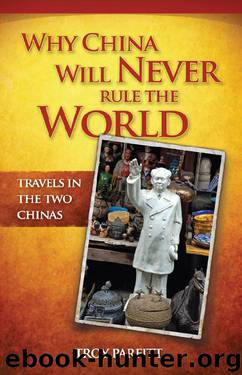Why China Will Never Rule the World by Troy Parfitt

Author:Troy Parfitt [Parfitt, Troy]
Language: eng
Format: epub
ISBN: 9780986803505
Publisher: Western Hemisphere Press
Published: 0101-01-01T00:00:00+00:00
CHAPTER EIGHTEEN
“A world away from China’s drab industrial towns,” my China: Eyewitness Travel Guides guidebook explains, “the breezy seaside city of Qingdao is a colourful port on the Shandong Peninsula. Known to foreign nationals as Tsingtao, where its namesake beer is brewed, pretty Qingdao’s charms derive from its German textures, namely its cobbled streets, red roof tiles, distinctive stonework, and tree-lined avenues. Its German legacy dates from 1897, when the city came under German jurisdiction, but was returned to Chinese control in 1922. Modern-day Qingdao is a clean, entrepreneurial, and forward-thinking city, a kind of miniature Shanghai with high ambitions.”
Other descriptions I had read of Qingdao were of similar stock. The coastal city was China’s answer to Brighton or Nice; a place to get away from the megacities like Beijing and Shanghai and be reinvigorated by the ocean air. You could stroll along the beach and dream about retirement. You could go for a dip. You could dine on seafood and stare at the water, imagining what lay beyond. I thought Qingdao was dreadful. It wasn’t a world away from China’s drab industrial towns. On the contrary, it was a drab industrial town. There was nothing whatsoever to set it apart from the dirt and dreariness of any other Chinese metropolis save for its littoral nature and a few slender strips of sand that separated it from the indistinct Yellow Sea. As for its being miniature, it was home to 7.6 million people. My notes for Qingdao begin, ‘First impression: slums, dirt, poverty. Qingdao – a desperate affair.’
The city was fringed by a cosmic assortment of rotting apartment blocks, hazy grey streets, pipe yards, construction pits, factories featuring stout brick smokestacks, and clotheslines strung from people’s homes to telephone poles and tilted street signs. To avoid the clotheslines, pedestrians had to duck underneath them every few metres. On a single drive, I saw scores of beggars and a group of elderly people cooking over a bonfire on the sidewalk. The German architecture (which looked remarkable in the software-modified tourist posters) had either been neglected or converted into restaurants covered with large tattered banners and sign-boards. The houses looked as though they were inhabited by squatters. Mind you, this was the old section of town. Later, I passed through a much nicer district, one built on Korean won and industriousness. That said, in my three days in Qingdao, I never once saw anything I would have labelled pretty.
Forty minutes after I checked into a draughty hotel, I got a phone call from the receptionist saying they needed to close. This was followed by a request to leave. I was given a full refund at the counter. My new hotel was located next to an elephantine construction pit. The old German railway station, minus its clock tower and tiny frontage, had been razed to build a new one in time for the Olympics. Qingdao was set to host the sailing competition.
It was morning and people were eating breakfast in garage-like zao dian (breakfast shops), consuming rice gruel, fried crullers, mantou, and soy milk.
Download
This site does not store any files on its server. We only index and link to content provided by other sites. Please contact the content providers to delete copyright contents if any and email us, we'll remove relevant links or contents immediately.
| Africa | Americas |
| Arctic & Antarctica | Asia |
| Australia & Oceania | Europe |
| Middle East | Russia |
| United States | World |
| Ancient Civilizations | Military |
| Historical Study & Educational Resources |
The Sympathizer by Viet Thanh Nguyen(4383)
The Rape of Nanking by Iris Chang(4200)
World without end by Ken Follett(3472)
Ants Among Elephants by Sujatha Gidla(3459)
Blood and Sand by Alex Von Tunzelmann(3192)
Japanese Design by Patricia J. Graham(3163)
The Queen of Nothing by Holly Black(2583)
City of Djinns: a year in Delhi by William Dalrymple(2546)
Foreign Devils on the Silk Road: The Search for the Lost Treasures of Central Asia by Peter Hopkirk(2454)
India's Ancient Past by R.S. Sharma(2450)
Inglorious Empire by Shashi Tharoor(2436)
Tokyo by Rob Goss(2426)
In Order to Live: A North Korean Girl's Journey to Freedom by Yeonmi Park(2377)
Tokyo Geek's Guide: Manga, Anime, Gaming, Cosplay, Toys, Idols & More - The Ultimate Guide to Japan's Otaku Culture by Simone Gianni(2359)
India's biggest cover-up by Dhar Anuj(2346)
The Great Game: On Secret Service in High Asia by Peter Hopkirk(2329)
Goodbye Madame Butterfly(2249)
Batik by Rudolf Smend(2176)
Living Silence in Burma by Christina Fink(2059)
